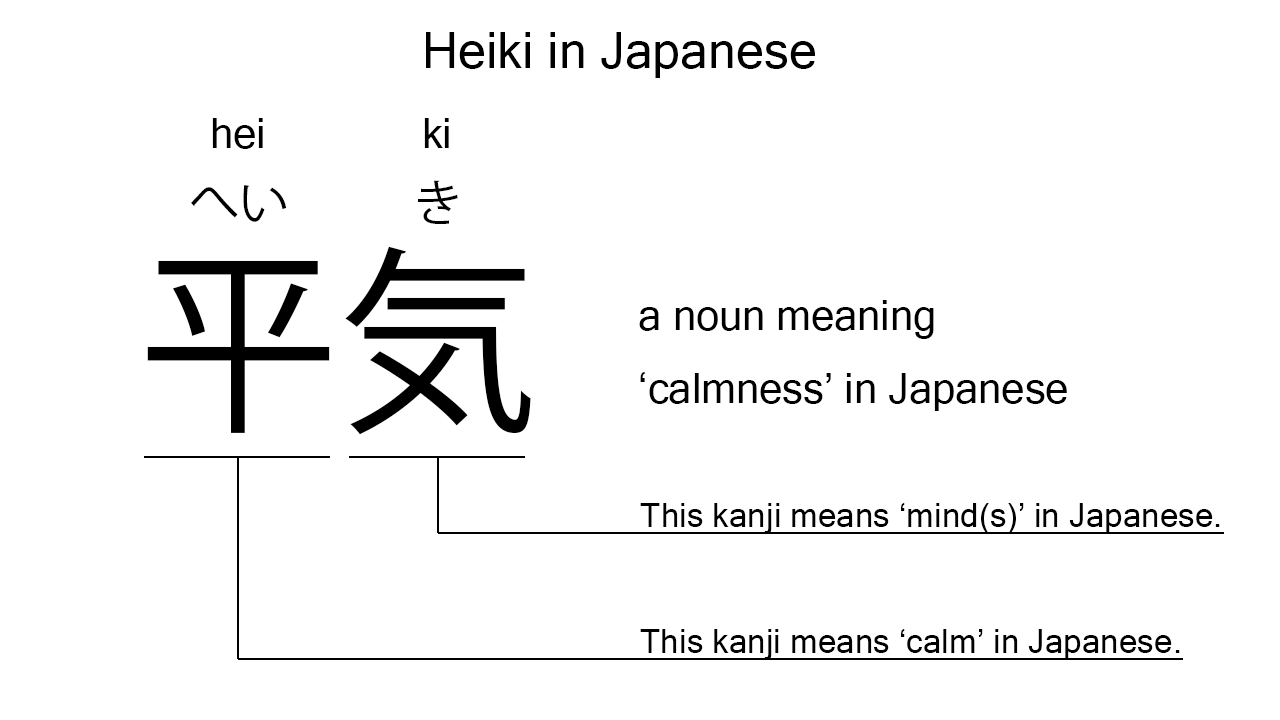What does “heiki” mean in Japanese?
Native speakers say “heiki” often to mean ‘no problem’ in Japanese. Perhaps, some Japanese learners know this word as it is sometimes used in Japanese conversations. In this blog post, however, I will explain it in detail based on its kanji expression. And also, I will explain how to use it through example sentences. My explanations would help Japanese learners understand “heiki” more clearly. Then, let’s get started!
Contents
- Definition and meanings of “heiki”
- What does “heiki” literally mean in Japanese?
- Repeat the same word twice: heiki, heiki
- Summary
Definition and meanings of “heiki”
Let me start with the definition and meanings of “heiki”.
- heiki – 平気 (へいき) : a noun meaning ‘calmness’, ‘coolness’, or ‘unmoved mind’ in Japanese. This can be used like an adjective to mean ‘calm’, ‘unmoved’, or such in Japanese. This can also be used like an interjection to mean ‘no problem’ or ‘okay’ especially in speaking.
In Japanese, the border between nouns and some adjectives called na-adjectives is very ambiguous. Many na-adjectives consist of a noun and a conjugative suffix, but native speakers quite often omit the suffix especially in speaking. Many Japanese nouns, therefore, can be the shortened versions of the corresponding na-adjectives. “Heiki” is one of them. It can work as the shortened version of “heikina” which is a na-adjective meaning ‘calm’ or ‘unmoved’ in Japanese.
The definition and meanings are not that difficult, I think. To understand this noun more clearly, however, let me explain its kanji characters in detail, one by one.
What does “heiki” literally mean in Japanese?
The kanji expression of “heiki” consists of the following two kanji characters:
- 平 : a kanji character used to mean ‘plain’, ‘flat’, ‘calm’, or such in Japanese. This can also be found in other words like “heiwa“.
- 気 : a kanji character used to mean ‘mood’, ‘mind’, ‘heart’, ‘spirit’, ‘will’, or ‘feeling’ in Japanese.
These two kanji characters tell us that the formed noun literally means a ‘calm mind’ in Japanese. This literal interpretation is very close to the actual meanings like ‘calmness’, I think. In addition, having a calm mind would be strongly related to having no problem. So, the interpretation is close also to the usages in speaking.

When we meet new kanji expressions, we should check their kanji characters in detail to understand their meanings clearly and deeply. In many cases, kanji characters tell us a lot about the meanings of the expressions they form. Actually, here, we could get the better understanding of “heiki” through the detailed kanji check above.
So far, I’ve explained the definition and meanings of “heiki” together with its kanji characters. Then, let me explain how to use it through the example sentences below.
Example #1: how to say “no problem” in Japanese
watashi wa heiki desu – 私は平気です (わたしはへいきです)
No problem for me. / I’m okay.
Below are the new words used in the example sentence.
- watashi – 私 (わたし) : a pronoun meaning ‘I’ in Japanese.
- wa – は : a binding particle working as a case marker or topic marker. In the example, this works after “watashi” to make the subject in the sentence.
- desu – です : an auxiliary verb used after a noun or adjective to make it polite. Probably, this is well known as a part of Japanese desu form. In the example, this is used after “heiki” to make it sound polite.
This is a typical usage of “heiki”. In the example, it works as the complement in the sentence. When we want to mean ‘no problem’ or ‘okay’ in Japanese, it is a very good option.
Example #2: another usage of “heiki”
kanojo wa heiki desu ka – 彼女は平気ですか (かのじょはへいきですか)
Is she okay?
Below are the new words used in the example sentence.
- kanojo – 彼女 (かのじょ) : a pronoun meaning ‘she’ in Japanese.
- ka – か : a sentence-ending particle used to make a question. As the definition suggests, this is used at the end of the example sentence to make the question.
This is another typical usage of “heiki”. In this example, it works as a part of the interrogative phrase, “heiki desu ka”, which means ‘is someone/something okay?’ in Japanese.
Repeat the same word twice: heiki, heiki
Sometimes, Japanese native speakers repeat a word twice to emphasize its meaning.
heiki heiki – 平気平気 (へいきへいき)
We can easily find this usage in Japanese movies, novels, manga, anime, and daily conversations. This is often translated into English as “okay. okay.” or “no problem. no problem.” This sounds a bit casual, so we need to be careful with its usage.
Summary
In this blog post, I’ve explained the definition and meanings of “heiki” in detail based on its kanji expression. And also, I’ve explained how to use it through the example sentences. Let me summarize them as follows.
- heiki – 平気 (へいき) : a noun meaning ‘calmness’, ‘coolness’, or ‘unmoved mind’ in Japanese. This can be used like an adjective to mean ‘calm’, ‘unmoved’, or such in Japanese. This can also be used like an interjection to mean ‘no problem’ or ‘okay’ especially in speaking. These two kanji characters literally mean a ‘calm mind’ in Japanese. This literal interpretation is very close to the actual meanings like ‘calmness’, I think. In addition, having a calm mind would be strongly related to having no problem. So, the interpretation is close also to the usages in speaking.
- heki heki – 平気平気 (へいきへいき) : the emphasized expression made by repeating the same word twice. This is often translated into English as “okay. okay.” or “no problem. no problem.”
Hope my explanations are understandable and helpful for Japanese learners.